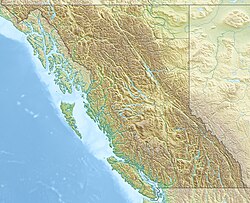The Towers (Canada)
| The Towers | |
|---|---|
 The Towers seen from a pond near Gog Lake | |
| Highest point | |
| Elevation | 2,842 m (9,324 ft)[1] |
| Prominence | 189 m (620 ft)[2] |
| Listing | Mountains of Alberta Mountains of British Columbia |
| Coordinates | 50°53′11″N 115°36′06″W / 50.88639°N 115.60167°W[3] |
| Geography | |
| Country | Canada |
| Provinces | Alberta and British Columbia |
| Parent range | Canadian Rockies |
| Topo map | NTS 82J13 Mount Assiniboine[3] |
| Climbing | |
| First ascent | 1916 Interprovincial Boundary Commission |
The Towers is a 2,842-metre (9,324-foot) mountain located on the border of Alberta and British Columbia on the Continental Divide. It also straddles the shared boundary of Banff National Park with Mount Assiniboine Provincial Park. It was named in 1917 by Arthur O. Wheeler.[1][2] Its nearest higher peak is Mount Magog, 2.5 km (1.6 mi) to the west.[2]
Geology[edit]
The Towers is composed of sedimentary rock laid down from the Precambrian to Jurassic periods.[4] Formed in shallow seas, this sedimentary rock was pushed east and over the top of younger rock during the Laramide orogeny.[5]
Climate[edit]
Based on the Köppen climate classification, The Towers is located in a subarctic climate with cold, snowy winters, and mild summers.[6] Temperatures can drop below -20°C with wind chill factors below -30°C.
See also[edit]
References[edit]
- ^ a b PeakFinder
- ^ a b c "The Towers". Bivouac.com. Retrieved 2019-03-03.
- ^ a b "The Towers (Alberta)". Geographical Names Data Base. Natural Resources Canada. Retrieved 2019-09-15.
- ^ Belyea, Helen R. (1960). The Story of the Mountains in Banff National Park (PDF). parkscanadahistory.com (Report). Ottawa: Geological Survey of Canada. Archived (PDF) from the original on 2015-10-02. Retrieved 2019-09-13.
- ^ Gadd, Ben (2008). "Geology of the Rocky Mountains and Columbias".
{{cite web}}: Missing or empty|url=(help) - ^ Peel, M. C.; Finlayson, B. L. & McMahon, T. A. (2007). "Updated world map of the Köppen−Geiger climate classification". Hydrol. Earth Syst. Sci. 11: 1633–1644. ISSN 1027-5606.


 French
French Deutsch
Deutsch
